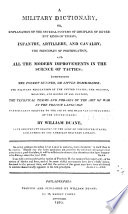 | Charles James - English language - 1805 - 1236 pages
...continued and successive change of place. There are three general laws of motion : 1. That a body always perseveres in its state of rest, or of uniform motion in a right line, till by some external force il be made to change its place : for as a body is passive in receiving... | |
 | William Duane - Electronic books - 1810 - 774 pages
...continued and successive change of place. — There are three general laws of motion: i Thar a body always perseveres in its state of rest, or of uniform motion in a right line, till by some exter ial f'oirc it be made t-> change its place : for asa body is passive in receiving... | |
 | Edward Augustus Kendall - Encyclopedias and dictionaries - 1811 - 516 pages
...continued and successive chang* of place. There are three general laws of motion. 1. That a body always perseveres in its state of rest, or of uniform motion in a right line, till by ; some external force it be made to change its state : for as a body is passive in receiving... | |
 | Edward Augustus Kendall - 1811 - 458 pages
...continued and successive cha'ng* of place. There are three general laws of motion. 1. That a body always perseveres in its state of rest, or of uniform motion in a right b'ne, till by some external force it be made to change its state : for as a body is passive in receiving... | |
 | Thomas Taylor - Philosophy, Ancient - 1812 - 622 pages
...uniformly forward in a right line. His first axiom, therefore, or law of motion, is false ; viz. " That every body perseveres in its state of rest, or of...compelled to change that state by forces impressed upon it." For, on the contrary, if a body is moved in a direction contrary to its natural tendency,... | |
 | Thomas Taylor - Philosophy, Ancient - 1812 - 628 pages
...uniformly forward in a right line. His first axiom, therefore, or law of motion, is false ; viz. "That every body perseveres in its state of rest, or of uniform motion in a right line, unless it*is compelled to change that state by forces impressed upon it." For, on the contrary, if a body... | |
 | John Mason Good - 1813 - 830 pages
...ur laws of motion, 1. Every body perseveres in its state of rest, or of uniform motion in a riglit line, unless it is compelled to change that state by forces impressed upon it. 2. The alteration of motion is ever proportional to the motive force impressed ; and is made... | |
 | Charles Hutton - Astronomy - 1815 - 686 pages
...causes and effects. In order to this, he lays down the following axioms or laws of motion. 1st LAW. Every body perseveres in its state of rest, or of uniform motion in a right line, unless it be compelled to change that state by forces impressed on it. — Thus, " Projectiles persevere in their... | |
 | Encyclopedias and dictionaries - 1816 - 778 pages
...of their caufes and effects. In order to this, he lays down the following axioms or laws of motion. i. EVERY BODY PERSEVERES IN ITS STATE OF REST, OR...COMPELLED TO CHANGE THAT STATE BY FORCES IMPRESSED UPON IT. — Sir Ifaac's proof of this axiom is as follows : " Projectiles perfevere in their motions,... | |
 | Johann Jakob Brucker - Philosophy - 1819 - 618 pages
...the world. The laws of motion, which arc the foundation of the Newtonian system, are these three: 1. Every body perseveres in its state of rest, or of uniform motion in a right line, unless compelled by some force impressed upon it to change its state. 2. The change of motion is proportional... | |
| |